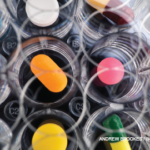- There is an increased risk of serious infections leading to hospitalization or death, including TB, bacterial, invasive fungal, viral and other opportunistic infections.
- If a serious infection develops, interrupt tocilizumab until the infection is controlled.
- Before starting treatment, perform a test for latent TB; if positive, start treatment for TB prior to starting the drug. Monitor all patients for development of active TB during treatment, even if the initial latent TB test was negative.
Warnings & Precautions
- Do not administer the drug during an active infection, including localized infections. If a serious infection develops, interrupt the drug until the infection is controlled.
- Gastrointestinal perforation—use with caution in patients who may be at increased risk.
- Laboratory monitoring is recommended due to potential consequences of treatment-related changes in neutrophils, platelets, lipids and liver function tests.
- Hypersensitivity reactions, including anaphylaxis and death, have occurred.
- Avoid the use of live vaccines with tocilizumab.
Dosage & Administration
Tocilizumab is administered by SQ injection or IV infusion. It may be used as monotherapy or in combination with MTX or other DMARDs. The recommended SQ dose is based on the patient’s weight.
When used in combination with DMARDs or as monotherapy, the recommended initial IV infusion dose is 4 mg/kg every four weeks followed by an increase to 8 mg/kg every four weeks based on clinical response.
Commentary
Tocilizumab is the first IL-6 inhibitor approved for the treatment of RA. The FDA first approved the IV infusion formulation for adults with RA in January 2010 and the pre-filled syringe formulation for SQ injection for adults with RA in October 2013. The most common adverse reactions (>5%) were upper respiratory tract infections, nasopharyngitis, headache, hypertension, increased alanine transaminase (ALT) and injection site reactions.
Sarilumab (Kevzara):30 injection
Drug class: IL-6 RA, DMARD
Boxed Warning
- There is an increased risk of serious infections leading to hospitalization or death, including TB, bacterial, invasive fungal, viral, and other opportunistic infections in patients receiving sarilumab.
- If a serious infection develops, interrupt the drug until the infection is controlled.
- Before starting treatment, perform a test for latent TB; if positive, start treatment for TB prior to starting the drug. Monitor all patients for development of active TB during treatment, even if the initial latent TB test was negative.
Warnings & Precautions
- Do not administer the drug during an active infection, including localized infections. If a serious infection develops, interrupt the drug until the infection is controlled.
- Gastrointestinal perforation—risk may be increased with concurrent diverticulitis or concomitant use of non-steroidal anti-inflammatory drugs or corticosteroids. Promptly evaluate acute abdominal signs or symptoms.
- Laboratory monitoring is recommended due to the potential consequences of treatment-related changes in neutrophils, platelets,
lipids and liver function tests. - Hypersensitivity reactions, including anaphylaxis and death, have occurred.
- Avoid the use of live vaccines with sarilumab.
Dosage & Administration
The recommended dosage of sarilumab is 200 mg once every two weeks, administered as a SQ injection. It can be used as monotherapy or in combination with MTX or other conventional DMARDs. Treatment should not be initiated in patients with an ANC <2,000/mm3, platelets <150,000/mm3, or liver transaminase levels above 1.5 times the upper limit of normal. Dose modifications are recommended in cases of neutropenia, thrombocytopenia and/or elevated liver transaminase levels.
Commentary
The FDA approval for sarilumab was based on results from two clinical trials that enrolled more than 2,900 adults with moderate to severe, active RA who had inadequate response to previous treatment regimens. In both studies, the primary endpoint was improvement in signs and symptoms of RA, as measured by the proportion of patients who achieved a 20% improvement using the ACR criteria at Week 24. Both studies showed the sarilumab-treated group had an improvement in the primary endpoint and a greater improvement in physical function, compared with the placebo group. The most common adverse reactions (>3%) were neutropenia, increased ALT, injection site erythema, upper respiratory tract infections and urinary tract infections.



